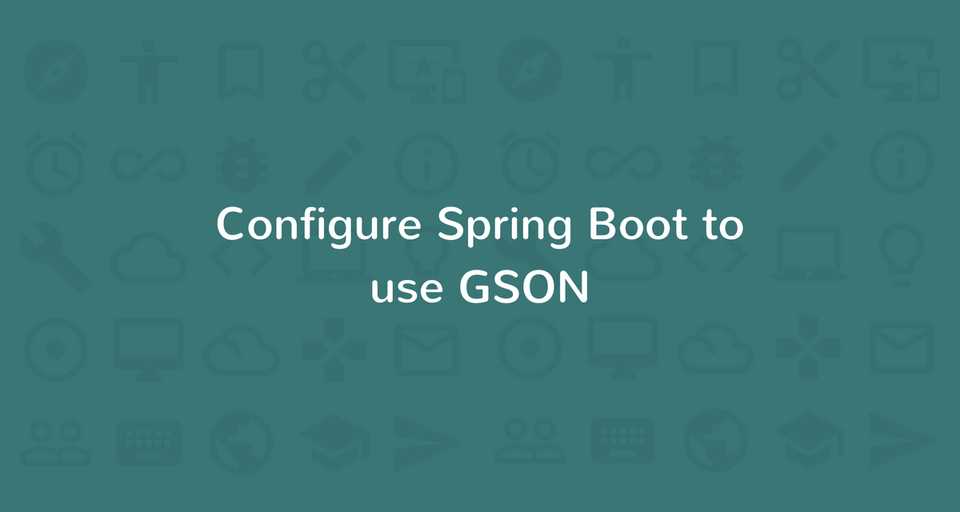Spring Boot uses Jackson by default for serializing and deserializing request and response objects in your REST APIs.
If you want to use GSON instead of Jackson then it’s just a matter of adding Gson dependency in your pom.xml file and specifying a property in the application.properties file to tell Spring Boot to use Gson as your preferred json mapper.
Force Spring Boot to use GSON instead of Jackson
1. Add Gson dependency
Open your pom.xml file and add the GSON dependency like so -
<!-- Include GSON dependency -->
<dependency>
<groupId>com.google.code.gson</groupId>
<artifactId>gson</artifactId>
<version>2.8.4</version>
</dependency>Once you do that, Spring Boot will detect Gson dependency on the classpath and automatically create a Gson bean with sensible default configurations. You can also autowire gson in your spring components directly like so -
@Autowire
private Gson gson;If you’re curious how Spring Boot does that, then take a look at this GsonAutoConfiguration class. Notice how it uses @ConditionalOnClass(Gson.class) annotation to trigger the auto-configuration when Gson is available on the classpath.
Jackson is also configured in a similar fashion with JacksonAutoConfiguration class.
2. Set the preferred json mapper to gson
You can now ask Spring Boot to use Gson as your preferred json mapper by specifying the following property in the application.properties file -
# Preferred JSON mapper to use for HTTP message conversion.
spring.http.converters.preferred-json-mapper=gsonThat’s all you need to do to force Spring Boot to use Gson instead of Jackson.
Configure GSON in Spring Boot
Now that your Spring Boot application is using Gson, you can configure Gson by specifying various properties in the application.properties file. The following properties are taken from Spring Boot Common Application Properties index page -
# GSON (GsonProperties)
# Format to use when serializing Date objects.
spring.gson.date-format=
# Whether to disable the escaping of HTML characters such as '<', '>', etc.
spring.gson.disable-html-escaping=
# Whether to exclude inner classes during serialization.
spring.gson.disable-inner-class-serialization=
# Whether to enable serialization of complex map keys (i.e. non-primitives).
spring.gson.enable-complex-map-key-serialization=
# Whether to exclude all fields from consideration for serialization or deserialization that do not have the "Expose" annotation.
spring.gson.exclude-fields-without-expose-annotation=
# Naming policy that should be applied to an object's field during serialization and deserialization.
spring.gson.field-naming-policy=
# Whether to generate non executable JSON by prefixing the output with some special text.
spring.gson.generate-non-executable-json=
# Whether to be lenient about parsing JSON that doesn't conform to RFC 4627.
spring.gson.lenient=
# Serialization policy for Long and long types.
spring.gson.long-serialization-policy=
# Whether to output serialized JSON that fits in a page for pretty printing.
spring.gson.pretty-printing=
# Whether to serialize null fields.
spring.gson.serialize-nulls= All the above properties are bound to a class called GsonProperties defined in Spring Boot. The GsonAutoConfiguration class uses these properties to configure Gson.
Excluding Jackson completely
If you want to get rid of Jackson completely then you can exclude it from spring-boot-starter-web dependency in the pom.xml file like so -
<dependency>
<groupId>org.springframework.boot</groupId>
<artifactId>spring-boot-starter-web</artifactId>
<!-- Exclude the default Jackson dependency -->
<exclusions>
<exclusion>
<groupId>org.springframework.boot</groupId>
<artifactId>spring-boot-starter-json</artifactId>
</exclusion>
</exclusions>
</dependency>More resources
You might also wanna check out the following articles on Spring Boot configuration -
I hope you enjoyed this article. Thanks for reading. See you next time!
